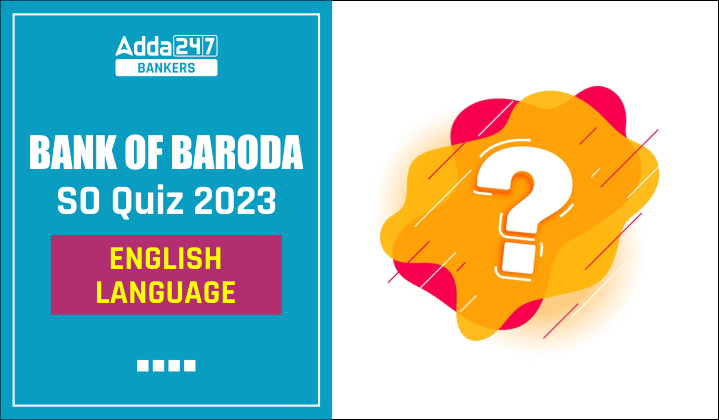Directions (1-10): Read each sentence to find out whether there is any grammatical or idiomatic error in it. The error, if any, will be in one part of the sentence. The number of that part is the answer. If there is ‘No error’, the answer is (e). (Ignore errors of punctuation, if any.)
Q1. It is I who have (A) / done this and (B) / you may hold (C) / me responsible for this. (D) / No Error (E).
(a) A
(b) B
(c) C
(d) D
(e) E
Q2. I am accustomed with (A) / hard work and (B) / I generally do not (C) / get tired easily. (D) / No Error (E)
(a) A
(b) B
(c) C
(d) D
(e) E
Q3. Each of the (A) / girls are good (B) / and has contributed (C) / immensely to our success. (D) / No Error (E)
(a) A
(b) B
(c) C
(d) D
(e) E
Q4. He came very close to me (A) / and asked me that if (B) / I would lend (C) / him some money. (D) / No Error (E)
(a) A
(b) B
(c) C
(d) D
(e) E
Q5. Many a man (A) / have been (B) / working (C) / under me. (D) / No Error (E).
(a) A
(b) B
(c) C
(d) D
(e) E
Q6. If all of you quarrel (A) / among yourself (B) / we shall not be able (C) / to solve your problems. (D) / No Error (E).
(a) A
(b) B
(c) C
(d) D
(e) E
Q7. After he had read the two first chapters (A) / of the novel, (B) / he felt like reading (C) / the book at one sitting. (D) / No Error (E).
(a) A
(b) B
(c) C
(d) D
(e) E
Q8. If you inform me (A) / of your’s arrival time (B) / I shall come to (C) / meet you at the airport. (D) / No Error (E)
(a) A
(b) B
(c) C
(d) D
(e) E
Q9. You cannot be (A) / granted admission (B) / unless you do not submit (C) / all the certificates in original. (D) / No Error (E)
(a) A
(b) B
(c) C
(d) D
(e) E
Q10. I promise (A) / to teach you (B) / everything you (C) / need to know. (D) / No Error (E)
(a) A
(b) B
(c) C
(d) D
(e) E
Solutions
S1. Ans. (e)
Sol. The sentence is grammatically correct.
S2. Ans. (a)
Sol. ‘accustomed to’ will be used in place of ‘accustomed with’ as preposition ‘to’ is used after ‘accustomed, habituated, addicted, committed, devoted, confined’.
Ex. She is accustomed to hard work.
S3. Ans. (b)
Sol. Use ‘is’ in place of ‘are’ as after ‘each of, either of, neither of’, plural noun or pronoun and singular verb is used.
Ex. Each of these girls is beautiful.
S4. Ans. (b)
Sol. ‘asked me if’ will be used in place of ‘asked me that if’ because in Indirect question, ‘that’ or ‘as to’ is not used after ‘if/ whether/ who/ which/ what/ where/ whose/ whom’.
Ex. She asked me why I was angry.
S5. Ans. (b)
Sol. ‘has’ will be used in place of ‘have’ as singular countable noun and singular verb is used after ‘many a/ many an’.
Ex. Many a man has been arrested.
Many an elephant has died here.
S6. Ans. (b)
Sol. Use ‘yourselves’ in place of ‘yourself’ as if ‘you’ is used in singular form then its reflexive/ Emphatic Pronoun ‘yourself’ is used but in plural form, its reflexive/ Emphatic pronoun ‘yourselves’ is used.
Ex. You hurt yourself.
All of you hurt yourselves.
S7. Ans. (a)
Sol. ‘The first two chapters’ will be used in place of ‘The two first chapters’ as ordinal adjective ( like…first, second…next, last etc.) is used first then after that cardinal adjective is used ( one, two, three, four etc.)
Ex. The first five chapters of this book.
S8. Ans. (b)
Sol. ‘your’ will be used in place ‘your’s’ because ‘your’ is a possessive adjective with which the use of ‘s is superfluous.
S9. Ans. (c)
Sol. ‘you submit’ will be used in place of ‘you do not submit’ as ‘not’ is not used with ‘unless, until, lest’.
S10. Ans. (e)
Sol. The sentence is grammatically correct.





 English Language Quiz For Bank Foundatio...
English Language Quiz For Bank Foundatio...
 English Language Quiz For Bank Mains Exa...
English Language Quiz For Bank Mains Exa...





